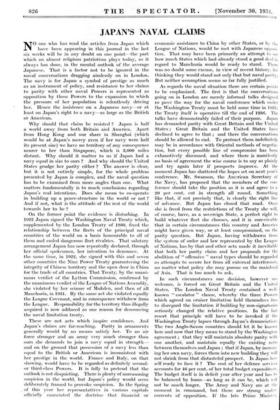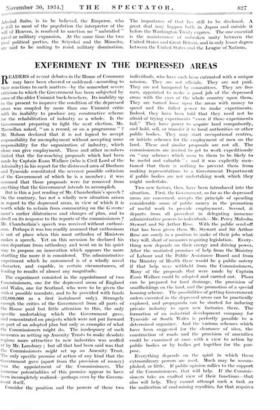JAPAN'S NAVAL CLAIMS
NO one who has read the articles from Japan which have been appearing in this journal in the last six weeks will be in any doubt on one point—the part which an almost religious patriotism plays today, as it always has done, in the mental outlook of the average Japanese. That is a factor not to be ignored in the naval conversations dragging aimlessly on in London. The navy is for Japan a symbol of prestige as much as an instrument of policy, and resistance to her claims to parity with other naval Powers is represented as opposition by those Powers to the expansion to which the pressure of her population is relentlessly driving her. Hence the insistence on a Japanese navy—or at least on Japan's right to a navy—as large as the British or American.
Why should that claim be resisted ? Japan is half a world away_ from both Britain and America. Apart from Hong Kong and our share in Shanghai (which would be at Japan's mercy even if her navy were -half its present size) we have no territory of any consequence nearer to her than Singapore, 'which is 3,000 mileS distant. Why should it matter to us if Japan had a navy equal in size to ours ? And why should the United States grudge her parity either ? The answer is clear, but it is not entirely simple, for the' whole problem presented by Japan is complex, and the naval question has to be examined from more angles than one. What matters fundamentally is to reach conclusions regarding Japan's real intentions. Does she mean to co-Operate in building up a peace-structure in the world or not ? And if not, what is the attitude of the rest of the world towards her to be ?
On the former point the evidence is disturbing. In 1922 .Japan signed the Washington Naval Treaty which, supplemented by the London Treaty of 1930, fixed the relationship between the fleets of the principal naval countries of the world on a basis honourable to all of them and ended dangerous fleet rivalries. That salutary arrangement Japan has now repeatedly declared, through her official spokesmen, her intention to denounce. At the same time, in 1922, she signed' with this and seven other countries the Nine Power Treaty guaranteeing the integrity of Chinese territory and the open door in China for the trade of all countries. That Treaty, by the unani- mous verdict of the Lytton Commission, confirmed by the unanimous verdict of the League of Nations AsSembly, she violated by her seizure of Mukden, and then of all Manchuria, in 1931. By the same act she violated equally the League CoVenant, and in consequence withdrew from the League. Responsibility for the territory thus illegally acquired is now adduced as one -reason for denouncing the naval limitation treaty.
These are not acts which inspire confidence. And Japan's claims arc far-reaching. Parity in armaments generally would by no means satisfy her. To an air force stronger and an army very much stronger than ours she demands to join a navy equal in strength— and on the ground that possession of a navy less than equal to the British or American is inconsistent with her prestige in the world. France and Italy, on that showing, would have to be regarded as definitely second- or third-class Powers. It is folly to pretend that the outlook is not disquieting. There is plenty of unreasoning suspicion in the world, but Japan's policy would seem deliberately framed to provoke suspicion: In the. Spring of this year her representatives in various capitals officially enunciated the doctrine that finaneial or economic assistance to China by other States, or by the League of Nations, would- be met with Japanese. opposi- tion. That may have been primarily an attempt to see how much States which had already stood a good deal in regard to Manchuria would be ready to stand. There was no doubt some excuse, in view of recent history, for thinking they would stand not only that but naval parity, But neither assumption seems so far fully justified.
As regards the naval situation there are certain-points to be emphasized. The first is that the conversations going. on in London are merely informal talks designed to pave the way for the naval conference which under the Washington Treaty must be held some time in 1935; the Treaty itself is operative till the end of 1936. The tallth have demonstrably failed of their purpose. Japan has demanded parity with Great Britain and the United States ; Great Britain and the United States have declined to agree to that ; and there the conversations should be allowed to end. To protract thein indefinitely may be in accordance with Oriental methods of negotia- tion, but every possible line of compromise- has been exhaustively discussed, and where there is manifestly no basis of agreement the wise course is to say so plainly and try again later if prospects improVe. At the moment Japan has shattered the hopes set on next year's conference. Mr. Swanson, the Amarican Secretary of the Navy, 'has proposed that the members of the con- ference should take the position as it is and agree to a 20 per cent. cut in strength all round. Something like that, if not precisely that, is clearly the right line of advance. But Japan has closed that road. Once she is freed from the restrictions of the Treaty she will, of course, have, as a sovereign State, a perfect right to build whatever fleet she chooses, and it is conceivable that in certain circumstances this country. and America might have given way, or at least compromised, on the parity question. But Japan, having withdrawn from the system of order and law represented by the League of Nations, has by that and other acts made it inevitable that both her parity 'claim and her proposals for the abolition of " offensive " naval types should -be regarded as attempts to secure her from all external interference, no matter what policy she may pursue on the mainland of Asia. That is too much to ask.
In such circumstances one decision, however un- welcome, is forced on Great Britain and the United States. The London Naval Treaty contained a well- known " escalator " clause, whereby the three Powers which agreed on cruiser limitation held themselves free to disregard the limitation if building by non-signatories seriously changed the relative positions. In the last resort that principle 'will have to be invoked if the Washington Treaty lapses through Japan's denunciation. The two Anglo-Saxon countries should let it be known here and now that they mean to stand by the Washington agreement ; that they will maintain absolute parity with one another, and maintain equally the existing ratio between themselves and Japan ; that if Japan, by increas- ing her own navy, forces them into new building they will not shrink from that distasteful prospect. Is Japan lwr- self ready to face it ? The cost of her defence services accounts for 46 per Cent. of her total budget expenditure. The budget itself is in deficit year after year and has to be balanced by loans—as long as it can be, which will not be much longer. The Army and Navy- are at the moment in command, - but there are strong under- currents of opposition. If the late Prime Minkter, Admiral Saito, is to be believed, the Emperor, who is still to most of the population the interpreter of the will of Heaven, is resolved to sanction no " unbridled " naval or military expansion. At the same time the two rival political parties, the Seiyukai and the Minseito, are said to be uniting to resist military domination. The importance of that has still to be disclosed. A great deal may happen both in Japan and outside it before the Washington Treaty expires. The one essential is the maintenance of unbroken unity between the United States and Great Britain, and in only lesser degree between the United States and the League of Nations.











































 Previous page
Previous page